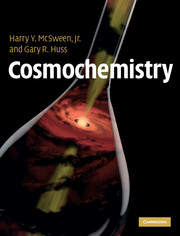
-
Select format
-
- Publisher:
- Cambridge University Press
- Publication date:
- 05 June 2012
- 29 April 2010
- ISBN:
- 9780511804502
- Dimensions:
- Weight & Pages:
- Dimensions:
- Weight & Pages:
You may already have access via personal or institutional login
Book description
How did the Solar System's chemical composition evolve? This textbook provides the answers in the first interdisciplinary introduction to cosmochemistry. It makes this exciting and evolving field accessible to undergraduate and graduate students from a range of backgrounds, including geology, chemistry, astronomy and physics. The authors - two established leaders who have pioneered developments in the field - provide a complete background to cosmochemical processes and discoveries, enabling students outside geochemistry to understand and explore the Solar System's composition. Topics covered include: - synthesis of nuclides in stars - partitioning of elements between solids, liquids and gas in the solar nebula - overviews of the chemistry of extraterrestrial materials - isotopic tools used to investigate processes such as planet accretion and element fractionation - chronology of the early Solar System - geochemical exploration of planetsBoxes provide basic definitions and mini-courses in mineralogy, organic chemistry, and other essential background information for students. Review questions and additional reading for each chapter encourage students to explore cosmochemistry further.
Reviews
‘A comprehensive treatment of the field of Cosmochemistry has been lacking and is long overdue. Hap McSween and Gary Huss have written a thorough and thoroughly enjoyable book that fills this gap. A really comprehensive, highly readable and overall first rate book. I highly recommend it to any scientist with interests in the chemistry and origins of solar systems. There is no doubt that I will adopt it for my own graduate course.’
Scott M. McLennan - State University of New York, Stony Brook
‘This new book by Hap McSween and Gary Huss, two highly acclaimed scientists in the field, takes on the difficult task of making the observations and core concepts of cosmochemistry clearly understandable to a non-specialized audience. The scope is broad, the pace pleasant, so this book will certainly be a very useful reference for introductory classes on the origin of the Solar System.’
Francis Albarède - Ecole Normale Supérieure de Lyon
‘This textbook provides a comprehensive overview of the modern field of cosmochemistry. A diverse range of topics … are covered in a logical and coherent manner. … This book should be considered indispensable for any student in the Earth and Planetary Sciences. It also serves as an essential reference for any researcher interested in planetary materials and the origins of planetary systems.’
Dante S. Lauretta - Lunar and Planetary Laboratory, University of Arizona, Tucson
'The book is very well written and is divided into 14 chapters that nicely introduce cosmochemistry to researchers interested in having a general overview on this topic. … To introduce a discipline so complex and diversified as cosmochemistry to a wide audience is rather difficult. The authors have succeeded in writing a comprehensive book on this matter that has turned out to be very attractive to read. …a compilation like this is useful not only to undergraduate and graduate students but also researchers from related fields.'
Source: Meteoritics & Planetary Science
'The text is well written and very well structured, with a summary of the most important pieces of knowledge at the end of each chapter. A very nice feature is also the 'boxes' … Each chapter has both references and suggestions for further reading which are very helpful. The book may be seen as an interdisciplinary effort to make cosmochemistry accessible for non-specialised readers with backgrounds such as physics, chemistry, astronomy or geology. … This book must be recommended particularly to undergraduate and graduate students in the fields related to cosmochemistry. It is, however, also a fascinating read for experts in the field, especially due to the presentation of historical aspects.'
Source: Contemporary Physics
Contents
Metrics
Altmetric attention score
Full text views
Full text views help Loading metrics...
Loading metrics...
* Views captured on Cambridge Core between #date#. This data will be updated every 24 hours.
Usage data cannot currently be displayed.
Accessibility standard: Unknown
Why this information is here
This section outlines the accessibility features of this content - including support for screen readers, full keyboard navigation and high-contrast display options. This may not be relevant for you.
Accessibility Information
Accessibility compliance for the PDF of this book is currently unknown and may be updated in the future.


